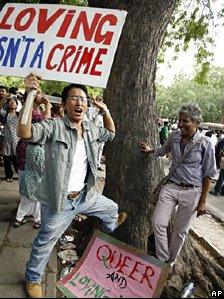India Supreme Court debates gay sex ruling
- Published

The ruling overturned a 148-year-old colonial law
India's Supreme Court has asked groups challenging a 2009 landmark judgement decriminalising gay sex in the country how "unnatural sex" should be defined.
The ruling overturned a 148-year-old colonial law which described a same-sex relationship as an "unnatural offence".
Under it homosexual acts were punishable by a 10-year prison term.
Many people in India still regard same-sex relationships as illegitimate, but rights groups have long argued that the law contravened human rights.
Section 377 of the colonial Indian Penal Code defined homosexual acts as "carnal intercourse against the order of nature" and made them illegal.
The 2009 Delhi High Court ruling is being challenged by political, social and religious groups who want to have colonial-era law reinstated.
On Wednesday, the court begun a debate on the legality of decriminalising gay sex in private between consenting adults.
"So who is the expert to say what is 'unnatural sex'? The meaning of the word has never been constant," Justices GS Singhvi and SJ Mukhopadhyaya asked a petitioner who challenged the judgement.
"We have travelled a distance of 60 years. Now it is test-tube babies, surrogate mothers. They are called discoveries. Is it in the order of nature? Is there carnal intercourse?" the judges said.
In July 2009 the Delhi High Court described the colonial-era law as discriminatory and said gay sex between consenting adults should not be treated as a crime.
Later the Supreme Court refused to put the judgement on hold after it was challenged by an astrologer and a yoga guru.
The ruling was widely and visibly welcomed by India's gay community, which said the judgement would help protect them from harassment and persecution.